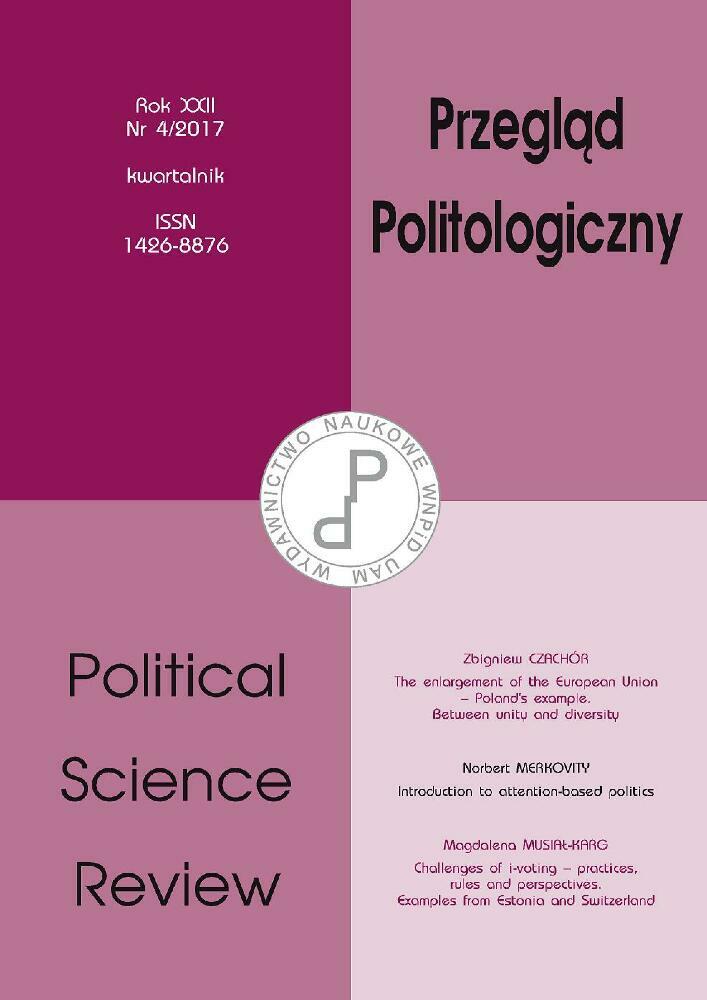Abstract
The significant role of the European Union in diffusion of evaluation in Europe is widely acknowledged (Stern, 2009). Although evaluation has a long-standing tradition in the EU, and in particular within the European Commission, in recent years one can observe the process of its expansion, diversification and institutionalisation. The aim of the paper is to explore the new developments in evaluation policy in the EU, which can be characterised, among others, by strengthening the links between ex ante and ex post impact evaluations and thus closing the policy cycle, where ex post evaluation feeds into ex ante assessment of new public actions. Hence, the problem of utilisation of evaluation findings is discussed. The scope of evaluation performed at the EU level has also been extended from expenditure to regulatory instruments. Moreover, there has been a shift from evaluating merely projects and programmes to evaluating policies and aggregated activities. To this end, a literature and documentary review on evaluation theory and practice have been conducted, as well as the analysis of the normative provisions that are applied to guide the practice of evaluation in the EU.References
Bienias S., Gapski T., Jąkalski J., Lewandowska I., Opałka E., Strzęboszewski P. (2012), Ewaluacja. Poradnik dla pracowników administracji publicznej, Ministry of Regional Development, Warsaw.
Cairney P. (2012), Understanding Public Policy. Theories and Issues, Palgrave Macmillian China.
De Laat B., Williams K. (2014), Evaluation Use Within the European Commission (EC): Lessons for the Evaluation Commissioner, in: Enhancing Evaluation Use. Insights from Internal Evaluation Units, eds. M. L. Loud, J. M. Mayne, Sage, pp. 147–174.
EGO s.c. (2008), Ocena systemu realizacji polityki spójności w Polsce w ramach perspektywy 2004–2006, Report commissioned by the National Evaluation Unit, Warsaw.
EGO s.c. (2013), Ocena systemu realizacji polityki spójności w Polsce w ramach perspektywy 2007–2013, Report commissioned by the National Evaluation Unit, Warsaw.
European Commission (2013b), Strengthening the foundations of Smart Regulation – improving evaluation, COM(2013) 686 final.
European Commission (2015), Better Regulation Guidelines, Commission Staff Working Document. Com (2015) 215 final.
European Commission (2013a), Public consultation on Commission Guidelines for Evaluation, http://ec.europa.eu/smart-regulation/evaluation/docs/20131111_guidelines_pc_part_i_ii_clean.pdf, 1.06.2016.
EVALSED (2013), The resource for the evaluation of Socio-Economic Development, http://ec.europa.eu/regional_policy/sources/docgener/evaluation/guide/guide_evalsed.pdf, 1.06.2016.
Ferry M., Olejniczak K. (2008), The use of evaluation in the management of EU programmes in Poland, Ernst&Young, Warsaw.
Fournier D. M. (2005), Evaluation, in: Encyclopedia of Evaluation, ed. S. Mathisons, Sage, Thousand Oaks, Calif.–London, pp. 139–140.
Højlund S. (2015), For Accountability or Learning?, “European Journal of Risk Regulation”, vol. 6, issue 1, pp. 35–46.
Izdebski H. (2007), From public administration to public governance, “Zarządzanie Publiczne”, vol. 1, pp. 7–20.
Kupiec T. (2014), Wykorzystanie ewaluacji w zarządzaniu programem operacyjnym na przykładzie RPO, http://www.kozminski.edu.pl/fileadmin/Konferencje/Ewaluacja_pregramow_operacyjnych/2.WykorzystanieEwaluacjiRPOPolska_T.Kupiec.pdf, 30.06.2016.
Langbein L., C. L. Felbinger (2006), Public Program Evaluation. A statistical guide, M. E. Shape, New York–London.
Markiewicz A., Patrick I. (2016), Developing Monitoring and Evaluation Frameworks, SAGE Publications Inc, USA.
Mayne J. (2014), Issues in Enhancing Evaluation Use, in: Enhancing Evaluation Use. Insights from Internal Evaluation Units, eds. M. L. Loud, J. M. Mayne, Sage, pp. 1–15.
National Evaluation Unit (2014b), Process of evaluation of the cohesion policy in Poland 2004–2014, Warsaw.
National Evaluation Unit (2014a), Impact of Evaluation on the Effectiveness and Efficiency of Implementation of the Cohesion Policy in Poland. Good Practices, Warsaw.
Olejniczak K. (2007), Ewaluacja jako narzędzie zarządzania w sektorze publicznym, in: Rozwój, region, przestrzeń, ed. A. Tucholska, Ministry of Regional Development, Warsaw, pp. 361–396.
Oleniczak K., M. Ferry (2008), Ewaluacja w praktyce sektora publicznego, in: Ewaluacja jako standard zarządzania w sektorze publicznym, ed. B. Pietras-Goc, Wyższa Szkoła Europejska im. ks. Józefa Tishnera, Kraków.
Ośrodek Ewaluacji Sp. z o.o. (2007), Ocena systemu wdrażania rekomendacji przez instytucje zaangażowane w realizację Sektorowego Programu Operacyjnego Rozwój Zasobów Ludzkich 2004–2006 i Programu Inicjatywy Wspólnotowej Equal, Report commissioned by the National Evaluation Unit, Warsaw.
Patton M. Q. (2004), Evaluation research, in: The Sage encyclopedia of social science research methods, eds. M. S. Lewis-Beck, A. Bryan, T. F. Liao, Sage, Thousand Oaks, Calif., pp. 337–340.
Roadmaps / Inception impact assessments, http://ec.europa.eu/smart-regulation/roadmaps/index_en.htm, 30.07.2017.
Simismans S. (2015), Policy evaluation in the EU: The Challenges of Linking Ex Ante and Ex Post Appraisal, “European Journal of Risk Regulation”, vol. 6, issue 1, pp. 6–26.
Stern E. (2009), Evaluation policy in the European Union and its institutions, “New Directions for Evaluation”, issue 123, pp. 67–85.
Van den Abeele E. (2015), “Better Regulation”: a bureaucratic simplification with political agenda, Working Paper 2015.04, European Trade Union Institute, Brussels.
Versluis E., van Keulen M., Stephenson P. (2011), Analyzing the European Union Policy Process, Palgrave Macmillan, London.
Vogel L., Van den Abeele E. (2010), Better regulation: a critical assessment, Report 113, European Trade Union Institute, Brussels.
